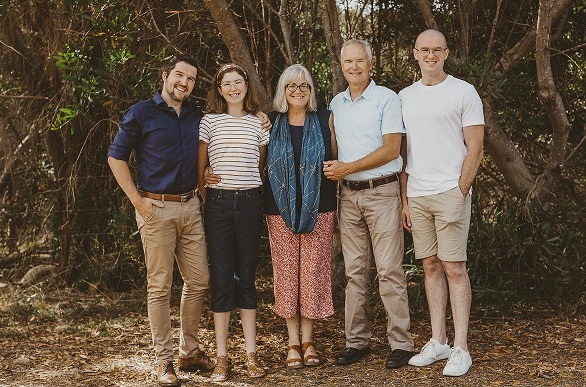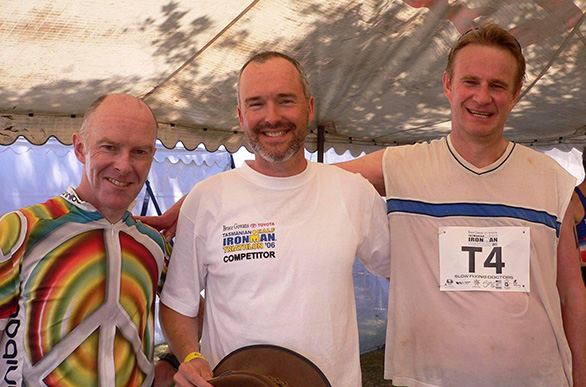Dr Brynley Parry through the eyes of his son, Dr Lucas Parry
Dad was born in Brisbane, but grew up in Melbourne from the age of two. After years of exclusive, practical study of Space Invaders and Galaxian in the arcades, Dad completed his medical degree at the University of Melbourne, graduating in 1986. He followed this with residency and a year of surgery at Shepparton in northern Victoria. While on a three-month stint in Swan Hill in northwest Victoria, young Bryn met a certain radiographer from Tasmania called Clare. Fast forward to 1990, the newly married couple relocated to Devonport where Dad started his Diploma of the Royal Australian and New Zealand College of Obstetricians and Gynaecologists at Mersey Community Hospital (MCH).
MCH has a soft spot in Dad’s heart. He has a number of patients whom he delivered himself, has cared for throughout their lives and now looks after their children too. It was quite common to see him arrive at the hospital on his bicycle under the light of the moon, rugged up and wearing a balaclava. One weekend, a midwife asked him how he was going to spend his Sunday and he replied, ‘Going to church’. She commented, ‘You must be very good!’ He replied, ‘No, I'm very bad. That's why I'm going!’
Mum and Dad didn’t know a soul in Devonport when they arrived and planned to stay only a year, but Bryn then found himself on the Family Medicine Program at East Devonport Medical Centre (EDMC). He signed on as partner in 1992 on the day I was born, stepping into the big shoes of the retiring Dr Blake . The now practice manager recalls, ‘I wasn’t sure how they’d cope with this young doctor, but I soon realised he had an old soul’. Bryn and Dr Blake shared a closely held belief, ‘being more interested in people than in disease’. Dr Blake took Bryn around every one of the many patients he visited. Bryn continued to visit these folks and many others all his working life, up to 40 km away. He strongly believes people are owed good medical care, even more when they become too frail to come to the practice. One of the nursing homes testifies that he always gave patients and staff extra time to explain and understand management plans, and that his handwriting was legible!

Lucas, Myf, Clare, Bryn and David Parry

Devonport Half Ironman: Dr Simon Monks, Dr Bryn Parry, Mr James Roberts-Thomson
Two years after the fateful day of my birth, when Dad, in a fit of passion, signed his life away to a medical practice, my brother David arrived. Fourteen more years passed before our beautiful baby sister Myf arrived. Growing up with a GP father and a sonographer mother meant being surrounded by all things medical. Dinnertime conversation would inevitably involve deep vein thromboses, pelvic masses and the like. I remember Dad regaling me, ‘I knew this guy wasn’t taking his wolfrin because his bloods didn’t make sense. He denied it three times but he confessed in the end’. I was convinced my dad was a psychic, and he prescribed ‘wolf’ drugs! At home, we were surrounded by drug-branded paraphernalia, from oven mitts to thongs. We even had a Viagra umbrella, which Dad said he could never get down after opening it.
Having a GP dad had other perks too. Myf says, ‘Dad’s immunisations are the only ones that never hurt. Once I got one at home while watching Peter Rabbit!’ When things were serious, we would ‘visit Dad at work’. He dug glass out of David’s foot and stitched up my forehead after he got me a good one during a battle with jousting sticks. We’d often drop by his work on the way home from school. Sometimes Dad would have a half-full bottle of liquid nitrogen on his desk, which would naturally lead to a white fog party and tongues stuck to metal lids.
Later on, Dad did a Grad Dip in Teaching and Learning, and was one of the inaugural teachers at the Rural Clinical School, where he worked part time for seven years. He has always been passionate about education, recruitment and quality standards in northwest Tasmania, which often battles understaffing and other rural workforce issues. Mum and Dad hosted John Flynn Placement Program students, and Dad was one of the first GPs, if not the first, to put his hand up to work at the then prototypical East Devonport Child and Family Centre, set up as a multipurpose outreach facility for the low socioeconomic demographic. His colleagues tell me he has a ‘privileged medical mind and is not afraid to use it’, ‘fantastic disposition to teach, and an amazing ability to make things complicated look easy’ and a ‘welcoming and warm care for others, as this is his nature’.
For years, Dad worked late on a Thursday at EDMC. One of the receptionists boasts she endured the all-time record for evening clinic: a 11:30pm finish. Dad looked after an extremely large number of patients with very complex, chronic needs. He ran famously behind, always taking as long as needed to counsel his loyal and often struggling patients. They would phone in advance to see how far he was behind, take a new arrival time and then happily ask, ‘Shall I call again before I come down?’ His patients knew that if someone needed extra time with him, he would give it to them, so they were happy to wait.
I’ve been told first hand that patients would ‘always feel heard’; one said, ‘he talked me off the ledge and saved my life’, and another said, ‘he gave me the key to unlock my innermost thoughts, lifting my heavy burden of sadness and grief’. Or as one put it, ‘over the last 30 years I’ve met some buggers of doctors, but I must say he is one of the better buggers. I consider him a friend’. Dad was known for his many metaphors. He told me once that he explained focused psychological strategies to a man by comparing it to a scene from the movie John Wick, where he smashes up his concrete floor with a sledgehammer to get to his cache of machine guns.
Dad always lamented that he didn’t follow his passion for maths. I acted as career counsellor for him on several occasions, as he expressed to me as that he shouldn’t have stayed in the same job for so long. He wanted to be a statistician, or a police officer or a missionary, and half-jokingly implored me to not follow his path. However, before long he’d be back to reminiscing about the heady old days, where ‘I could tell the difference between an ectopic and appendicitis with 100% accuracy’ and ‘got so many cannulas in first go that people would crowd around me to see if the streak would end’. As well as boasting like a classic dad, he also had ‘hobby horses’ that we’d all roll our eyes at when he hopped on. Do not get him started on pertussis or the Women’s Health Initiative. When my wife and I announced our first pregnancy, we endured a 20-minute tutorial on Naegele’s law of gestation.
I chose medicine after falling out of love with palaeontology at the age of 13, and after hearing about the cool job my paediatrician uncle had, but you can’t fight your genes. During my own obstetrics and gynaecology stint at MCH, a midwife who I had never met called loudly down the hallway, ‘You’d be Bryn’s son!’ I followed my nose to general practice and am proud to share this connection with my father.
Mum says the plan was to be in Tasmania for one year, but it’s just hit 31. Their sons have married Tasmanian girls, their daughter has just started high school and they are proud grandparents to my son Robbie. Bryn, the Melbourne boy, is somewhat surprised to find himself embedded in the heart of the Devonport community.
In early 2020, while playing B-grade cricket with the Mersey Colts, Dad noticed he was struggling to run between the wickets. This soon turned into a foot drop, so he got a brace and started being worked up. Scans, LPs and obscure blood tests all drew blanks. In September, my parents were delivered the diagnosis of motor neuron disease (MND) and Dad retired three months later.
Dad has been overwhelmed by the outpouring of loving support from so many patients, colleagues and friends during this unexpected and sudden change in life circumstances. In February, his cricket club, church and workplace joined forces to put on a fun day in Devonport, raising funds for MND research at the Menzies Research Institute. Over 2000 people came, and at last count over $90,000 was raised. In his speech on the day, Bryn credited his patients with teaching him resilience, as they endured their own suffering over the years.
As a patient with MND, Dad seems to be much better than when he was a sonography patient once for Mum. She said he was one of the worst patients she’d ever seen; complaining about how cold the gel was, whinging about being poked and prodded and questioning her technique. As an MND patient, he seems to be taking each day as it comes and has a resolve to not give up. I think he will only stop riding his bike, swimming and going to cricket training when he physically can’t anymore. Dad’s been given a two-year prognosis, but every single one of us knows he doesn’t run on time. As a community, and especially as a family, we are eternally thankful for the time we’ve been given with Dr Brynley Parry.